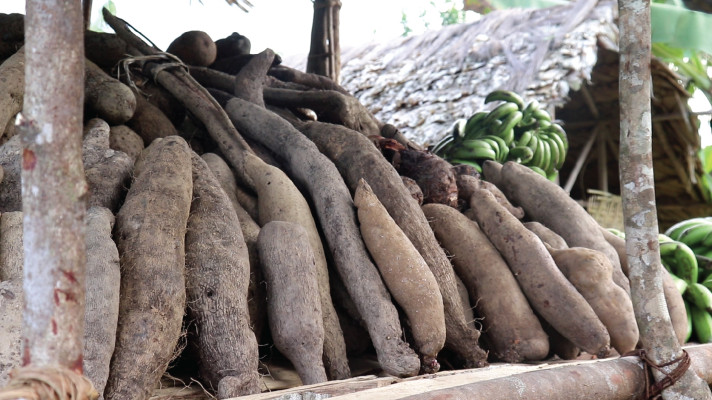The Stewardship Department of the Central Papua Conference (CPC) have identified K20 thousand worth of tithes and offerings buried underground in remote districts. This information came about as the Stewardship Director Pr. Wally Kapi was conducting stewardship awareness and farming inspections in the Maria and Kwikila Districts recently. He said many rural church members have the power in their hands to convert their soil into a money-making asset.
Pr. Kapi was in Maria District for its one-week District Camp Meeting from August 15 – 22 when he came across Adventist farmers who invested heavily in banana farming. Villages in the area are well known for their ‘samoan’ bananas that supplied the markets in the city of Port Moresby every day. However, there is lack of evidence back in the area to show the impact of cash-flow. No permanent buildings and no small businesses in the area indicated that the money earned from their banana sales are not put to good use.
The people stated that they were afraid of jealousy and sorcery practices in the area. Once someone decided to improve their livelihood, jealousy takes over the neighbors and relatives.
Pr. Kapi visited several gardens in the area, especially in Bagubara village, and was pleased to see villagers engaging in pawpaw and cocoa farming. He said pawpaw trees take 3 months to grow before it bears fruits. The first harvest contains 30 fruits and the tree lasted for 3 years. That means if you sell 30 fruits for a fixed rate of K5 you will get K150 from just the first harvest of a single pawpaw tree. Multiply that with the number of pawpaw trees in your farm and you will be blessed abundantly at the end of your sales.
The concept of ‘primary source tithing’ is emphasized by the director who said that it is better to tithe the land and the primary source than to set aside tithes after sales. That means you have to set apart God’s tithe on the land and the primary source of your food produce such as the whole pawpaw and banana trees.
The villagers in Maria District such as Kiru, Monatou, Bagubara, Mumuiru and others were eager to learn more but time will not allow.
While in Kwikila District Inland camp meeting from August 30 – September 13, Pr. Kapi was full of praise for the villagers who showed they can grow a vast variety of foods. Yams, taros, bananas, sweet potatoes, singapores, nuts such as okaris and peanuts and even rice. In addition to that there is an abundant supply of greens such as ‘choko’ tips. A food house was erected for all the yams and other garden foods to be brought and stored during the one-week meeting. The yam tubes were as long as 1 meter with a diameter of approximately 8 - 10 centimeters.
‘Food shortage is not an issue here in Barai, Boto, Onohuro, Dorobisoro and Mimai,’ said Obadiah Boboro, a Boto villager, farmer and Boto SDA church elder. ‘The only issue here is all about how to convert these food crops into cash,’ he remarked.
Boto is located 82 kilometers northwest of Port Moresby. The nearest airstrip is at Dorobisoro which would take 2 hours walk from Boto to get there. There is no road link to transport garden produce to the main center Port Moresby. Those who wish to get to the capital city would have to endure 3 days of journey by foot before reaching the nearest road in Debari, Kwikla.
Such harsh geographical conditions have hindered the villagers from transporting their garden foods to the markets. Hence, there is lack of cash flow in the area.
Eld. Boboro was one of the participants who attended the agricultural training in Bautama last year 2020. He told the CPC Media that he did put into practice what he was taught of at Bautama and was blessed to see his garden yielding more foods than he first ever expected.
He said he and his wife, Naomi, decided to allocate a plot of land within his garden to the Lord. Then they went about planting seeds in the Lord’s plot first before theirs. The result made him speechless. The pigs kept their distance from his garden. The pests withdrew. The crops in his plot and the Lord’s began to grow rapidly and in fine health. His yams grew bigger, longer and heavier. His bananas and other crops were bigger and healthier as well.
Unfortunately, he said, when harvesting he has no way to convert his garden produce into cash for tithes and offerings.
The Stewardship Director estimated around K20 thousand worth of tithes and offerings for one whole year have gone back into the ground because of lack of economic activities in the area.
He encouraged the locals to be mindful of how they spend their hard-earn cash during his daily sessions with the church members and interested locals in Maria and Kwikila District Inland camp meetings
K20 Thousand Worth of Tithes and Offering Untapped in Rural Districts
16 Aug 2021

